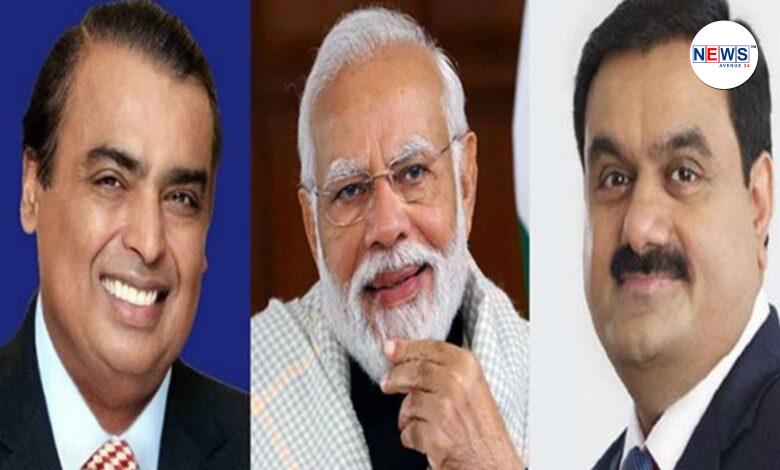
PM Modi, Gautam Adani, Mukesh Ambani shaping India to become economic superpower: Report
According to the report, the Modi government has begun a massive infrastructure transformation by spending billions on building roads, ports, airports and railways. It is also heavily promoting digital connectivity, which can improve both commerce and daily life.
21st-century economic powerhouse: India is poised to become a 21st-century economic powerhouse, presenting itself as a viable alternative to China for investors seeking growth and for reducing supply supply chain risks, according to a CNN report. The report said that Prime Minister Narendra Modi, along with industrialists Gautam Adani and Mukesh Ambani are playing a fundamental role in shaping the economic superpower the country will become in the coming decades.
Investors have been applauding the strategic moves made by Adani and Ambani in sectors prioritised for development by Prime Minister Modi, it said, adding that to spur growth, the ruling BJP government has begun a massive infrastructure transformation by spending billions on building roads, ports, airports and railways.
As per the report, the Modi government is heavily promoting digital connectivity, which can improve both commerce and daily life.
‘Adani and Ambani have become key allies’
The report said, “Both Adani and Ambani have become key allies as the country embarks on this revolution.”
Worth USD 3.7 trillion in 2023, India is the world’s fifth largest economy, jumping four spots in the rankings during PM Modi’s decade in office and leapfrogging the United Kingdom.
“It is comfortably placed to expand at an annual rate of at least 6 per cent in the coming few years, but analysts say the country should be targeting growth of eight per cent or more if it wants to become an economic superpower. Sustained expansion will push India higher up the ranks of the world’s biggest economies, with some observers forecasting the South Asian nation to become number three behind only the US and China by 2027,” the CNN analysis said.
Reliance Industries and the Adani Group, both colossal conglomerates with valuations exceeding USD 200 billion each, have established businesses in sectors ranging from fossil fuels and clean energy to media and technology.
“Investors have been cheering the duo’s ability to adroitly bet on sectors prioritised for development by Prime Minister Narendra Modi, currently campaigning for his third consecutive term to lead India. The South Asian country is poised to become a 21st-century economic powerhouse, offering a real alternative to China for investors hunting for growth and manufacturers looking to reduce risks in their supply chains,” the report said.
“As a result, these three men — PM Modi, Ambani and Adani — are playing a fundamental role in shaping the economic superpower India will become in the coming decades,” it added.
Adani and Ambani compared to John D. Rockefeller
The report also highlighted that the level of power and influence being enjoyed by these two Indian tycoons has been seen before in other countries “experiencing periods of rapid industrialisation.”
It said that journalists often compare both Adani and Ambani to John D. Rockefeller, who became America’s first billionaire during the Gilded Age, a 30-year period in the late 19th century.
“India is in the middle of something that America and lots of other countries have already gone through. Britain in the 1820s, South Korea in the 1960s and 70s, and you could argue China in the 2000s,” said James Crabtree, the author of The Billionaire Raj, a book about India’s wealthy.
Mumbai, which is considered India’s financial hub, has the imprint of the two tycoons everywhere, visible in everything from high-rise apartment buildings developed by Adani Realty to cultural establishments bearing the Ambani name. Even the city’s international airport is now under Adani’s operation.
“Some spaces need no names or bright labels, but their affiliations are just as obvious. Everyone in Mumbai knows who lives in Antilia — the personal skyscraper of Ambani and his family, which reportedly cost $2 billion to build and boasts a spa, three helipads and a 50-seat theatre. The 27-story building sits on a street dubbed ‘Billionaires’ Row,’ its jutting geometric architecture looming over the neighbourhood.”
The CNN report also mentions the grand pre-wedding celebration of Mukesh Ambani’s son Anant Ambani in March this year, when billionaires and movie stars from around the world jetted to Jamnagar.
Mark Zuckerberg, Bill Gates and Ivanka Trump were among the many high-profile celebrities in attendance. The three-day celebration, which saw performances by popstar Rihanna and magician David Blaine, transfixed India and further underscored Ambani’s growing global clout.
Guido Cozzi, professor of macroeconomics at the University of St Gallen in Switzerland, said these “conglomerates are very, very important and very well connected,” noting that both the Adani Group and Reliance Industries were founded years before PM Modi came to power. “They are not typical stagnant monopolistic conglomerates. They are pretty dynamic,” Cozzi said.
Playing important role in building infrastructure
He further said that they are not only are they playing an ‘important role’ in building infrastructure, which helps ‘growth directly,’ but the two business groups are also helping the country expand “indirectly” by boosting connectivity through digital innovation.
Reliance was founded by Ambani’s father, Dhirubhai, as a small yarn trading firm in Mumbai in 1957. Over the next few decades, it grew into a colossal conglomerate spanning energy, petrochemicals and telecommunications.
Mukesh Ambani has not only upended India’s telecom sector in less than a decade but also become a top player in sectors ranging from media to retail.
The report said that Mukesh Ambani’s ambition and breathless pace of expansion is matched by Adani, “…who now helms businesses ranging from ports and power to defence and aerospace”.
AEL is core of everything India wants to accomplish
Starting his journey as a first-generation entrepreneur, this 62-year-old initially ventured into diamond trading before establishing a commodity trading business in 1988, which later evolved into Adani Enterprises Limited (AEL). According to a January report by American brokerage firm Cantor Fitzgerald, AEL “is at the core of everything India wants to accomplish.”
AEL serves as an incubator for Adani’s various ventures, with many of them emerging as top players in their respective industries. Cantor notes that the company’s present emphasis on airports, roads, and energy positions it as “a unique long-term investment opportunity.”
The report notes that while both the barons built much of their fortune from fossil fuels, they are now investing billions in clean energy. Notably, their green energy pivot comes at a time when India has set itself some ambitious climate goals.
The report also notes that despite India’s success in terms of growth rate, soaring youth unemployment and inequality remain stubbornly persistent problems. In 2022, the country ranked a lowly 147 on gross domestic product (GDP) per person, a measure of living standards, according to the World Bank.
Opposition parties in India have targeted the BJP-led government alleging it has ties with the country’s super-rich and over the meteoric rise of Adani. The report said PM Modi’s “perceived relationship with the billionaires” is once again being questioned by rivals during the Lok Sabha polls
Some processes, particularly more transparency in the allocation of India’s natural resources and the overhauling of the country’s bankruptcy laws, have seen important reforms under PM Modi, he added.
Closeness between politicians and business elit help in growing nation faster
According to report, some experts say that “some amount of closeness” between politicians and business elite “can help in growing the nation faster.”
The report also suggests that India needs to encourage entrepreneurship and innovation bringing more firms into the sphere, as a country, where millions of people join the labour force every month, can’t be absorbed by a few conglomerates.
“They are phenomenal … entrepreneurs, who have been able to sustain steady growth and development in a vibrant yet sometimes chaotic political and business environment that exists in India,” said Rohit Lamba, an economist at Pennsylvania State University, who is also the co-author of Breaking the Mould, a 2023 book that examines how Indian economy can grow.
“India cannot grow rich before it becomes old on the back of a few big firms like Adani or Ambani…India should make more firms,” he added.
The report says India has other conglomerates as well. The 156-year-old Tata Group wields immense power over various key sectors ranging from steel to aviation, but it often does not invite the same scrutiny as the newer conglomerates, mainly because it is controlled by philanthropic trusts and not run as a family dynasty.
India has been the fastest-growing large economy in the last three financial years.
(With PTI inputs)
News Source:- INDIA TV





